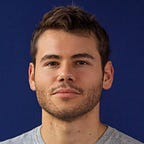Raw Ambition — David Hunter
EF is proud to announce the $115 Million first close of its new Global Fund. This will allow us to continue funding even more incredible individuals from all over the world to build game changing companies. David Hunter is the CEO and Co-Founder of Optimal Labs, a company that applies cutting-edge machine learning to create intelligent autopilots for farms, improving the efficiency, reliability and quality of food production.
Flying High From Day One
If there’s one primary characteristic we look for in the individuals we fund at EF, it’s ambition. Ambition to be the best they can be and make the most of their unique skill sets; ambition to found a huge company that only they could build; and ambition that picks them back up and coming back for more every time they get knocked down.
David Hunter is one of our most exceptional founders, and is the epitome of unfettered ambition. His drive has manifested itself in successful careers in the military and banking — but fortunately for us and the world, he’s now channeling his ambition to solving one of humanity’s biggest problems as an entrepreneur.
David grew up in Aylesbury, Buckinghamshire with the childhood dream of becoming a pilot. After being inspired by a conversation with his next door neighbour, who’d been in the the air force himself, David decided to join the Air Cadets and never looked back. His childhood dream was eventually made a reality by the Royal Air Force who sponsored him through Sixth Form and his degree in Aeronautical Engineering at Imperial College, allowing him to do part of his flying training during his studies there. But towards the end of his degree he had a change of heart and feeling his skills would be better suited to a career outside of the air force, he decided to become a trader.
Leading the March of the Machines
David was put on the algorithmic trading desk at UBS at a time when more and more of the trading volume in big banks was being automated. Fortunately, he’d been programming computers since he was a kid and that made him one of the only traders on the floor who knew how computers actually worked.
“I had this very fortunate right-place, right-time career in banking, because I was able to bridge a gap between technology and human decisions within trading” he says, reflecting on his meteoric rise in the sector, which ended up with him running the algorithmic trading desk at German behemoth Deutsche Bank while still in his mid twenties.
When he started in trading, David estimates that approximately 30% of all trades were executed by machine and that the other 70% were executed manually. But while he was at Deutsche Bank, his team managed to automate almost all of the trading volumes.
With a high status job and a handsome salary, most people would have continued to milk this type of competitive advantage for everything it was worth. But not David — most trades had now been automated and as he puts it himself, “there wasn’t much room room to grow from 99.5% to 100%.” He knew he wanted a new challenge, so he left Deutsche to start something of his own.
Persistence Personified
David was frustrated by his early attempts to find a co-founder and start a business, citing a lack of appetite and experience in the UK ecosystem back in 2012 as a limiting factor.
“In the UK, we didn’t have a natural start-up ecosystem where you could meet co-founders,” he says “Most of the people I know who did engineering and other technical subjects had goals to progress in finance not to start companies. It wasn’t really a thing.” Fortunately though, he was introduced to EF CEO Matt Clifford through a mutual friend and after deciding that the program seemed right for him, David joined the fourth London cohort.
However his journey wasn’t straightforward; his time on the cohort didn’t work out and David left the program without a seed funded company. Reflecting on his experience, David believes that he ended up working with the right person on the wrong idea. “When I joined EF4 I knew I wanted to start a technology company, but now looking back on it I realize that saying you want to be a technology entrepreneur is a bit like saying you want to be an author. It’s not enough, it’s not specific enough.”
After doing a bit of thinking, he decided the best next step would be to get to the edge of a field rather than starting another company immediately. So, he went back to University and did a Masters in Computer Science at Oxford, where he spent most of the year doing research in deep reinforcement learning, a branch of advanced machine learning.
He re-applied for EF, this time with the knowledge of what he wanted to do and the type of co-founder he was looking for and was accepted to the seventh London cohort. After teaming up with his co-founder Joao Abrantes, the two founded Optimal Labs, a company looking to revolutionise the future of food production by applying cutting-edge machine learning to improve the efficiency, reliability and quality of food production.
High-tech greenhouses can grow nutritionally-optimised food, all year round, without pesticides, directly outside major cities with 10–40x the yield of traditional field farming. Optimal’s technology will allow high-tech greenhouses to be rapidly deployed outside cities around the world, increasing the availability of safer, healthier food and securing our food system for the future. A suitably ambitious task for a uniquely ambitious individual.
At EF, we want our founders to build world changing companies because the opportunity cost of not doing so is too great. If you want to scale your ambition like David and build a world changing company, apply now for one of our next cohorts in London, Berlin, Paris, Singapore, Hong Kong or Bangalore at joinef.com.
